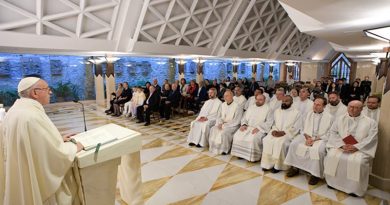Why do Catholics call Priests ‘Father’?
Father William Saunders
This question refers to Jesus’ teaching found in the Gospel of St. Matthew, when He said, “Do not call anyone on earth your father. Only one is your father, the One in heaven” (23:9).
Taken literally, we would have to wonder why we do use the title “Father” when Jesus seems to forbid it. First, we must remember the context of the passage. Jesus is addressing the hypocrisy of the scribes and the Pharisees—the learned religious leaders of Judaism. Our Lord castigates them for not providing good example; for creating onerous spiritual burdens for others with their various rules and regulations; for being haughty in exercising their office and for promoting themselves by looking for places of honor, seeking marks of respect and wearing ostentatious symbols. Basically, the scribes and Pharisees had forgotten that they were called to serve the Lord and those entrusted to their care with humility and generous spirit.
Given that context, Jesus says not to call anyone on earth by the title, “Rabbi,” “Father” or “Teacher,” in the sense of arrogating to oneself an authority which rests with God and of forgetting the responsibility of the title. Yes, as Jesus said, only the heavenly Father is the true Father, and the Messiah, the true teacher and rabbi.
Nevertheless, we do use these titles in common parlance: We call those who instruct us and others “teacher”; our male parent “father”; and Jewish religious leaders “rabbi.” Especially in a religious sense, those who serve the Lord and represent His authority, as a teacher, parent and especially a priest, must be mindful of exercising it diligently, humbly and courageously. To use this authority for self-aggrandizement is pure hypocrisy. Jesus said at the end of this passage, “Whoever exalts himself shall be humbled, but whoever humbles himself shall be exalted.”
Since the earliest times of our Church, we have used the title “Father” for religious leaders.
Bishops, who are the shepherds of the local Church community and the authentic teachers of the faith, were given the title “Father.” Actually, until about the year 400, a bishop was called “papa” for Father; this title was then restricted solely to addressing the Bishop of Rome, the successor of St. Peter, and in English was rendered “pope.”
Are you sad? Here are Pope Francis’s 10 tips for happiness
In an early form of his rule, St. Benedict (d. c. 547) designated the title to spiritual confessors, since they were the guardians of souls. Moreover, the word “abbot,” denoting the leader in faith of the monastic community, is derived from the word abba, the Aramaic Hebrew word for father, but in the very familiar sense of “daddy.”
Later, in the Middle Ages, the term “father” was used to address the mendicant friars—like the Franciscans and Dominicans—since by their preaching, teaching and charitable works they cared for the spiritual and physical needs of all of God’s children. In more modern times, the heads of male religious communities, or even those who participate in ecumenical councils such as Vatican II, are given the title “father.” In the English-speaking world, addressing all priests as “Father” has become customary.
On a more personal note, the title for me is very humbling. As a priest, “Father” reminds me that I am entrusted with a grave responsibility by our Lord—His faithful people. Just as a father must nourish, instruct, challenge, correct, forgive, listen and sustain, the priest must meet the spiritual needs of those entrusted to his care, providing them with the nourishment of our Lord through the sacraments. He must preach the Gospel with fervor and conviction in accord with the mind of the Church, challenging all to continue on that path of conversion which leads to holiness. He must correct those who have erred but with mercy and compassion.
5 Rare Photos from Pope Francis’ Childhood
In the same spirit as the father with his prodigal son, the priest must reconcile sinners who have gone astray but seek a way back to God. As a father listens to his child, so must a priest listen to his spiritual children, providing counsel and consolation.
A priest must also be mindful of the “physical” needs of his flock—food, housing, clothing and education. While priests may be celibate, the words of our Lord to His Apostles ring true: “I give you My word, there is not one who has given up home, brothers or sisters, mother or father, children or property for Me and for the Gospel who will not receive in this present age a hundred times as many homes, brothers and sisters, mothers, children and property—and persecution besides—and in the age to come, everlasting life” (Mk 10:29-30).
All of us must pray for our priests, especially those that serve in our own parishes, that by God’s grace they may strive to fulfill the responsibility of being “Father.”
Fr. Saunders is president of Notre Dame Institute and pastor of Queen of Apostles Parish, both in Alexandri.
This article appeared in the June 16, 1995 issue of “The Arlington Catholic Herald.” Courtesy of the “Arlington Catholic Herald” diocesan newspaper of the Arlington (VA) diocese. For subscription information, call 1-800-377-0511 or write 200 North Glebe Road, Suite 607 Arlington, VA 22203.
Source: http://www.ewtn.com/library/answers/whyfathr.htm






Comments are closed.